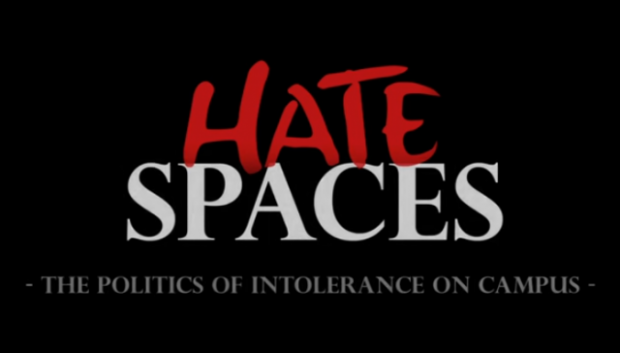VIDEO: Hate Spaces — How the New Antisemitism threatens Jewish Students on American Campuses
Two of my four granddaughters are undergraduates at an elite university in Illinois. Another granddaughter is in her sophomore year at American University. The environments on their campuses, despite significant Jewish enrollment have become increasingly hostile towards Israel and Jewish students. Whether it is the aggressive Boycott Divestment Sanctions (BDS) movement or the hate filled Israel Apartheid Weeks with their Islamist pro-Palestinian vitriolic speakers, faux apartheid walls, swastika plastered campus vandalism or mock eviction notices tacked on dorm room doors: threats to Jewish students have exploded with undisguised venomous hatred. Hatred is typically expressed by “delegitimizing, demonizing“and applying inappropriate “double standards” to the Jewish nation of Israel.
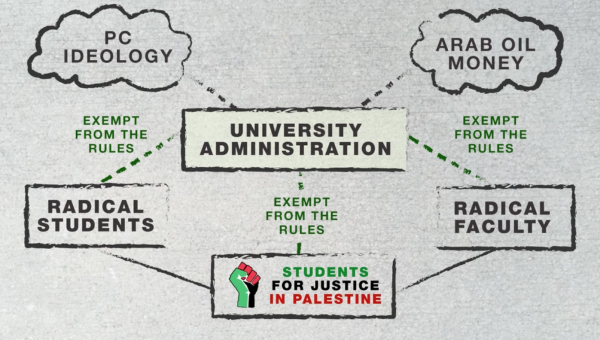
Incredulously, this aggressive campaign is backed by student affiliates of the Muslim Brotherhood in America; Muslim Student Association (MSA) and the misnamed Students for Justice in Palestine (SJP) chapters. There are 163 active SJP chapters on campuses across this country. The funds supporting this anti-Semitic campaign are raised by American Muslims for Palestine (AMP) revealed in Congressional testimony as an affiliate of Hamas. Hamas is a US State Department designated foreign terrorist organization. Equally bizarre is that many college administrations rationalize their failure to protect Jewish students, under the guise that anti-Israel bias and hostile campaigns are protected by academic freedom and free speech. Meanwhile Jewish students find themselves besieged, with little or no Jewish community support to counter the biased and sometimes hateful professoriate and the left/Muslim alliance on campuses across the country.
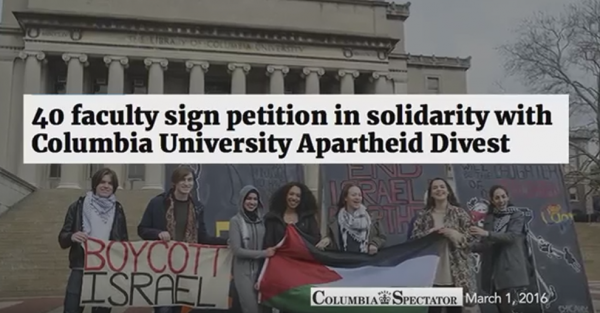
To say that it makes the environment for Jewish students on campus uncomfortable is an understatement. With increasing intimidation threatening violence against Jewish students, it has reached historic proportions of intolerance and antisemitism.
That is why the latest documentary by the team at Americans for Peace and Tolerance, Hate Spaces: The Politics of Intolerance on American Campuses is a must see for those who care about America and the importance of universities in a democracy. This is not the first time at this rodeo for Dr. Charles Jacobs and Avi Goldwasser producers of J Street Challenge, Forgotten Refugees and Losing Our Sons, about two fathers who lost sons to jihad in America. Back in 2004 they produced Columbia Unbecoming about Middle East faculty intimidation of Jewish students at one of our family’s alma maters.
So what caused them to produce this latest documentary?

Avi Goldwasser
Here’s what Avi Goldwasser said:
We’ve been observing the increased hostility toward Jewish students on campus for the past decade. As you may recall, we produced a film called Columbia Unbecoming in 2004 which documented the intimidation by professors of Jewish students who supported Israel. We thought that the film would be a wakeup call for the Jewish community and the people of New York. Sadly, despite getting significant attention, the power structure in the universities prevailed and the hostility continued.
Today, the situation is much worse and more pervasive. While many anti-Jewish incidents and the BDS campaign are reported by the media, few are willing to connect the dots and report on the underlying ideology and extremist organizations that are inciting the hostility.
We hope that this film will provide such an understanding that good and decent people will be mobilized to address this outrageous scandal that has marginalized Jews. All we ask is that Jewish students be treated equally and be provided the same protections afforded other minority students.
Power rules our campuses, and those who speak truth to power are punished. We want to reach people in leadership positions both civic and political leaders to bring change. We also want to energize the public to demand that our leaders in the community and on campus live up to their stated values. What is happening on campus is contrary to American values, and to values of decency. ‘That is not who we are’.

Dr. Charles Jacobs
Here’s what Dr. Charles Jacobs said:
The situation on campus reflects an enormous failure on the part of Jewish community leadership. At base is the leadership’s failure to acknowledge the new antisemitism, the seemingly unlikely alliance of leftists and Islamists. More specifically, Jewish leaders seem not to comprehend or to ignore the structural factors on the campus that make defense of Israel (and its supporters) extraordinarily difficult, namely the overwhelmingly radical anti-Israel professoriate, the significant influence of the Middle East Studies departments with their Arabist view, the various ethnic and gender studies departments united in hate under the banner of intersectonality , and the well-funded anti-Israel radical student groups.
In the face of this enormous institutionalized power arrayed against Jewish students, the Jewish establishment, misunderstanding the assault as an academic debate over facts and history — gave to Jewish students only reasons and facts with which to fight. Jewish students were handed “Myths and Facts,” the hasbara bible, to “correct” the “myths” that somehow found their way onto the campus. Jewish leadership failed to understand that we cannot win by fighting power with facts. This is clearly a failed strategy and it must be rethought and changed. The film is dedicated to this proposition.
As depicted in Hate Spaces, much of the campus intolerance is driven by the new Antisemitism, hatred of Israel based on lies and myths often organized as part of the international Boycott, Divestment and Sanctions (BDS) movement It is modeled on the South African Boycott movement of the 1980’s. A number of national academic faculty associations have passed resolutions supporting BDS. Liberal church groups and international charities have pushed resolutions to divest securities of companies doing business in Israel, and especially against products produced in ‘occupied territories’ and even left wing Jewish groups like Jewish Voices for Peace.
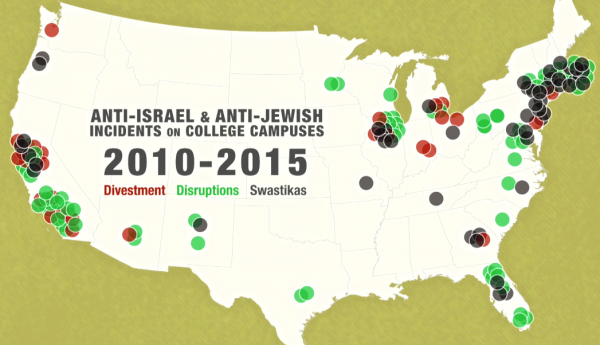
Anti-Israel Anti-Semitic Incidents on College Campuses 2010-2015.
APT has graphically documented this plague of hate and intimidation on college campuses, including vital data from the AMCHA Initiative in Jew hatred incidents on college campuses across the US.
Here were some the observations about the scandalous situation on campus depicted in Hate Spaces by noted commentators:
Alan Dershowitz, Emeritus Professor, Harvard Law School
There is an incredible double standard on college campuses. If you say anything critical of Islam or Islamic extremists you’re subject to being considered a bigot violating university rules. But you can say anything you want about the nation-state of the Jewish people.
Caroline Glick, Deputy Managing Editor, Jerusalem Post
The more that people attach themselves to ideologies that reject reason, that reject objective reality, that reject facts, that reject history, the more likely you’re going to see very aggressive anti-Semitism.
Bret Stephens, Wall Street Journal “World View Columnist”
It’s very difficult to deal with the blizzard of lies, I mean, because you can always invent some kind of fiction and that requires enormous efforts to essentially prove the negative: that, in fact, did not happen. I think many of the people who are now joining SJP out of a totally misguided idealism are the useful idiots of the twenty-first century.
Melanie Philips, Daily Mail columnist.
Prejudice and bigotry are all about lies. Antisemitism, Jew-hatred is based on a set of deranged lies and libels about the Jewish people.
William Jacobson, clinical practice Professor Cornell Law School and creator of the Legal Insurrection blog
You will never hear protests about how Hamas treats people in Gaza. You won’t hear about the brutal repression of Palestinians by the Palestinian authority. There is never a concern expressed by these groups on campus about Palestinians unless it can be used against Israel.
What the battle nowadays is about on campuses, it’s not giving pro-Israel students any special rights, it’s simply treating them with the same protections for their speech as are afforded to anti-Israel groups.
Richard Landes former Boston University Professor
It’s post-imperialist, or post-colonialists’, thought that feeds a whole dimension of the critique of Israel. A lot of intellectuals are playing out this sort of colonial guilt thing and using Israel as their sacrificial lamb. They sacrifice Israel to what is, in fact, the most ferocious imperialist, colonialist force. The Israelis are now being told, “You have to make concessions as a way of achieving some kind of absolution for the West’s sins against the world.”
So, who is behind this?
Hate Spaces reveals that a Muslim Brotherhood connected organization; American Muslims for Palestine (AMP) is behind aggressive Jew hatred fomented by Students for Justice on college campuses.
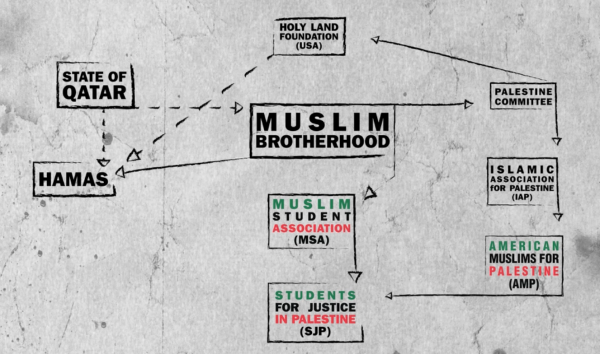
The Muslim Brotherhood was founded in Egypt by school teacher Hassan al Banna in 1928 in an attempt to replace the Ottoman Caliphate with a system based on Sharia law hateful to unbelievers, especially Jews and Christians. Banna was a Hitler devotee and both he and the Grand Mufti of Jerusalem, the Haj Amin al Husseini, Hitler’s House guest during WWII, supported extermination of European Jews.
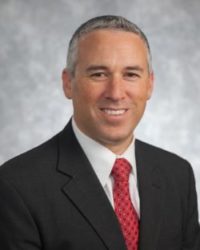
Dr. Jonathan Schanzer, V.P Research, Foundation for Defense of Democracies.
The documentary depicts the April 2016 testimony given by Dr. Jonathan Schanzer, before the US House Foreign Affairs Committee on Threats to Israel. Dr Schanzer is Vice President for Research at the Washington, DC – based foundation for Defense of Democracies and a former specialist on terrorism finance at the US Treasury Office of Foreign Asset Control. Schanzer laid out the connections between AMP, SJP, the Muslim Brotherhood Charity, the Holy Land Foundation and the Islamic Association for Palestine that figured in the 2008 Federal Dallas trial and conviction of the Muslim charity’s leaders . The Chicago-based AMP was founded by Hamas supporter University of California law professor Hatem Bazian in 2004. The purpose was to launch the international BDS campaign on American college campuses sponsoring the Israeli Apartheid weeks with hate-filled propaganda coinciding with the period celebrating Israel Independence. AMP funds these projects. Beginning in 2011, SJP began a campaign targeting Jewish students directly by tacking ‘eviction notices’ on college dorm rooms. According to information available AMP has spent over $100,000 on the various MSA, BDS and SJP eviction notices agit-propaganda campaigns in 2014, alone.
Schanzer presented evidence on the 2008 Federal Dallas trial in Houston, Texas that resulted in the conviction of five leaders of a Muslim charity, the Holy Land Foundation, who funneled in excess of $12.7 million to designated foreign terrorist group, Hamas. The trial revealed a 1991 plan, obtained by the FBI, prepared by Muslim Brotherhood operatives to infiltrate our government and media to eventually overthrow our Constitution to be replaced by Sharia, Islamic law. Schanzer noted three former members of the Holy Land Foundation who are now employees of AMP. The extensive fund rising for the Holy Land Foundation and Hamas was facilitated by the Islamic Association for Palestine. There were several unindicted co-conspirators designated in the trial proceedings among them the Islamic Society of North America, Council of American Islamic Relations, Islamic Circle of North America and the Muslim Student Association.
Watch this trailer of Hate Spaces and can arrange for showings in your community to inform both prospective students and their parents about the New Antisemitism powering intolerance on American Campuses.

